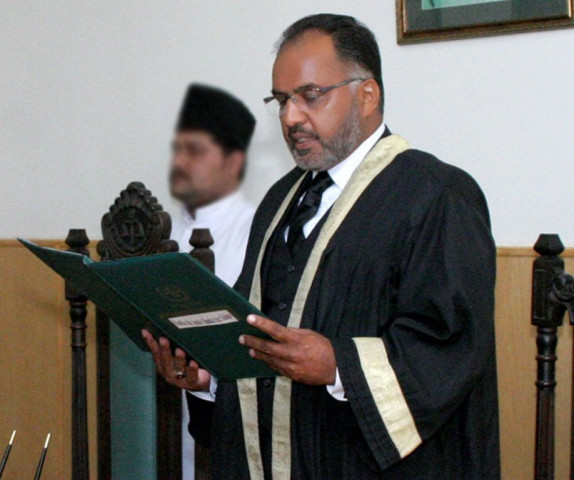SJC bars media from commenting on proceedings
Allows media only to report on open court trial of Justice Shaukat Aziz Siddiqui

PHOTO: EXPRESS
The five-member SJC led by the Chief Justice of Pakistan (CJP) Mian Saqib Nisar has issued a written order, which says proceedings of the council will be reported in the matter related to IHC judge but no public comments shall be made.
“We direct that no media discussion, articles or editorials shall be written or published in this matter and no public comments shall be made...only proceedings of the council shall be reported,” said the two-page order, available with The Express Tribune.
SC to hear international firm's plea seeking Volume 10 of JIT
The order, however, notes that this council shall be entitled to revert to in-camera proceedings in case there arises a situation as 'contemplated in the apex court’s May 10, 2018 order.
“We allow the proceedings in this matter to be held in open court subject to the restrictive measures taken by the council regarding attendance and presence of persons in court,” said the order. The SJC will resume hearing on July 30.
It is for the first time that inquiry against any superior judiciary’s judge will be conducted in open court. The SJC’s rule says inquiry against a judge will be held in-camera. In the complaint pending against the IHC judge since 2015, eight allegations have been levelled against him.
In February, the SJC served another show-cause notice on Justice Siddiqui for questioning the role of ‘a constitutional institution’ in the matter relating to the Tehreek-e-Labbaik Pakistan’s Faizabad sit-in last year. Later, the judge submitted a reply in this regard but the council rejected it.
The SJC on May 18, 2017 dismissed his plea seeking an open trial. Later he challenged the council order in the apex court, which issued a 77-page verdict on May 10, 2018.
Justice Shaukat Siddiqui's office in IHC catches fire
The apex court in its judgment observed that if there is a reasonable apprehension that the judge whose capacity or conduct is being inquired into or his lawyers are likely to indulge in scurrilous and scandalous allegations against the SJC or its members especially with the intention to publicise the same so as to hamper the SJC from fulfilling its obligations, the SJC can always direct that the proceedings before it be conducted in camera, even if such judge has waived his privilege of in camera proceedings.
“Such a course of action would be in accordance with the well-recognised and established exceptions to open justice. Such exceptions have been enumerated hereinabove.
“In-camera proceedings can also be resorted to despite the desire of a person whose conduct and capacity are being inquired into, if any of the aforesaid exceptions, in the information of the SJC exist,” it said.
The order said the obvious purpose of the in-camera proceeding is the protection of the rights and reputation of the person whose conduct and capacity are being inquired into and the protection of the institution of the judiciary, including members of the SJC.



















COMMENTS
Comments are moderated and generally will be posted if they are on-topic and not abusive.
For more information, please see our Comments FAQ